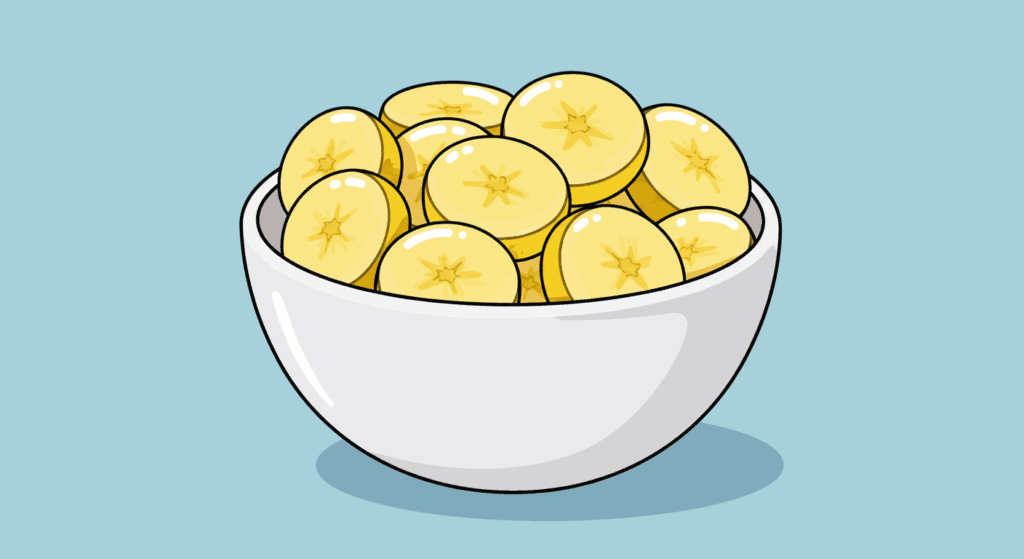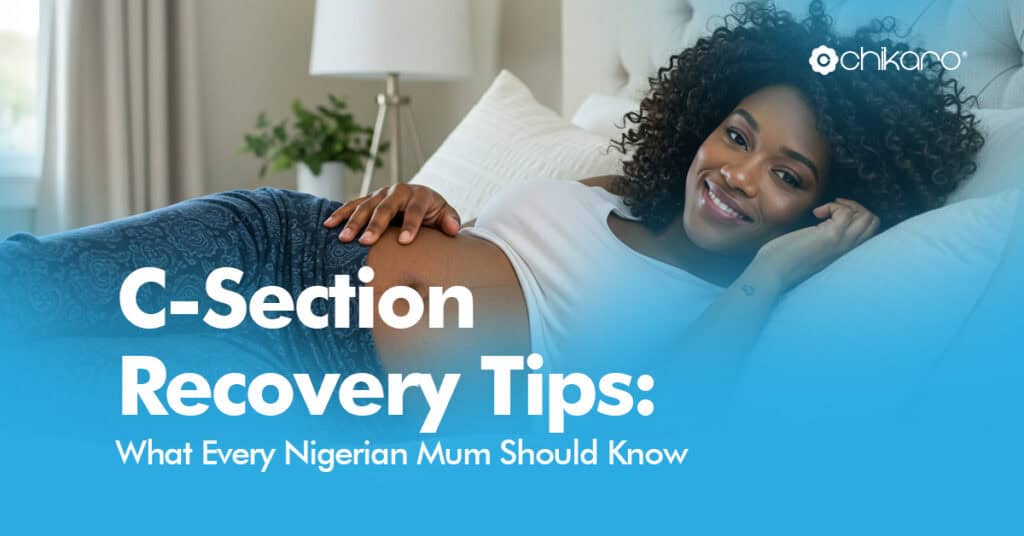Whether planned or unplanned, a cesarean section (C-section) is a major surgery and your recovery deserves just as much care and attention as the birth itself.
According to Healthline, C-sections are just not an everyday procedure. It’s a major surgery, incisions are made into the abdomen and uterus.
For Nigerian mums, managing recovery while balancing cultural practices, family expectations, and sometimes limited medical support can feel overwhelming. That’s why having the right C-section recovery tips at your fingertips makes all the difference.
At Chikaro, we’re committed to walking alongside you from bump to baby and beyond. This guide brings together medical advice, cultural realities, and practical tools to help you heal with confidence.
What Happens After a C-Section?
A C-section is not a minor procedure. It involves cutting through abdominal and uterine layers to deliver your baby. After surgery:
- You’ll likely remain in the hospital for 3–5 days.
- Doctors will administer pain medication and antibiotics.
- Movement may be difficult during the first few days.
- You’ll be adjusting to breastfeeding, newborn care, and fluctuating hormones—all while healing from surgery.
This is why following practical C-section recovery tips is so critical for your comfort and long-term health.
Why C-Section Recovery Tips Matter
Many mums underestimate the physical and emotional impact of a C-section. In Nigeria, where cultural norms often expect mothers to “bounce back” quickly, it’s easy to feel pressured. But healing takes time. Following the right C-section recovery tips ensures:
- You reduce the risk of infections and complications.
- You regain mobility safely and at your own pace.
- You balance cultural practices with medical advice.
- You focus on bonding with your baby without constant pain.
Essential C-Section Recovery Tips
Let’s break down practical C-section recovery tips that Nigerian mums can realistically follow.
1. Prioritise Rest (As Much As Possible)
You’ve had major surgery, and your body needs downtime to heal. Rest doesn’t mean doing nothing but minimising strenuous activity. Sleep when your baby sleeps, and don’t hesitate to ask for help.
C-section recovery tip: Limit lifting anything heavier than your baby during the first few weeks.
2. Support Your Incision
The incision area will feel sore and sensitive. Protect it whenever you laugh, cough, or sneeze by pressing a pillow gently against your abdomen.

C-section recovery tip: Avoid wearing tight clothes or waistbands over your scar. Opt for loose dresses or maternity gowns.
Chikaro Pick: Postpartum belly wraps designed for gentle support.
3. Start Moving Slowly
Staying immobile increases the risk of blood clots. Within 24–48 hours, start gentle walking. This also encourages digestion and circulation.

C-section recovery tip: Take slow, short steps and avoid stairs in the first week.
4. Eat Light, Nutritious Foods
Your digestive system may feel sluggish after surgery. Begin with light meals like pap, ogi, pepper soup, and broth. Gradually add fruits, vegetables, and fibre-rich foods.

C-section recovery tip: Drink lots of water to ease digestion and reduce constipation.
5. Watch for Signs of Infection
Healing well means staying alert. Call your doctor immediately if you notice:
- Fever or chills.
- Redness or swelling around the incision.
- Pus or unusual discharge.
- Pain that suddenly worsens.
C-section recovery tip: Keep your incision clean and dry. Pat (don’t rub) after bathing.
Must-Have C-Section Recovery Essentials
The right tools make recovery smoother. Here are essentials every Nigerian mum should consider:
- High-Waisted Cotton Briefs – Prevent irritation on your scar.
- Maternity Nightgowns or Robes – For easy feeding access and comfort.
- Abdominal Binder or Belly Wrap – Offers support while standing or walking.
- Nursing Pillow – Reduces strain on your abdomen during feeding.
- Foot Stool or Step – Helps with getting in and out of bed.
- Pain Relief & Stool Softeners – Follow your doctor’s guidance.
C-section recovery tip: Invest in breathable, soft fabrics to avoid discomfort in Nigeria’s hot climate.
Chikaro Picks: C-section friendly underwear, gentle belly wraps, and postpartum robes.
Nigerian Cultural Practices and C-Section Recovery
Cultural traditions shape recovery experiences. Here’s how to balance them with safe medical practices.
What Helps:
- Omugwo support: Having your mum or mother-in-law around means extra rest.
- Light soups and hydrating drinks: Pepper soup, kunu, and pap provide nourishment.
- Herbal teas (with medical approval): Some can aid relaxation and digestion.
What to Be Careful About:
- Hot water massages: Only attempt after stitches heal, using lukewarm—not boiling—water.
- Tight body binding: Wait until your doctor approves before binding your abdomen.
- Overexertion: Respect your healing pace, even if family pressures you.
C-section recovery tip: Blend helpful traditions with safe medical practices.
How Long Does Recovery Take?
Recovery isn’t one-size-fits-all. Most mums start feeling better after 2–3 weeks, but full healing usually takes 6–8 weeks.
C-section recovery tip: Attend your 6-week postnatal check-up to monitor healing and discuss family planning.
Emotional and Mental Healing
Physical recovery is only half the story. Emotional recovery matters too. After surgery, some mums feel sadness, guilt, or frustration. This is normal.
C-section recovery tips for mental wellness:
- Journal your thoughts or gratitude moments.
- Talk openly with your partner about how you feel.
- Join Nigerian mum support groups online or in your community.
- Speak to a professional if sadness lingers, it could be postpartum depression.
Returning to Normal Activities
Eagerness to resume everyday life is normal, but patience is key.
- Exercise: Wait at least 6–8 weeks before resuming. Start with light walks.
- Driving: Avoid until you can turn comfortably and are no longer on strong pain meds.
- Sexual intimacy: Discuss with your doctor at the 6-week check.
C-section recovery tip: Don’t compare your timeline with others. Every body heals differently.
Partner and Family Involvement
Support from partners and family plays a huge role. Encourage them to:
- Handle household chores.
- Help with diaper changes.
- Offer emotional reassurance.
C-section recovery tip: Don’t hesitate to delegate, your health comes first.
Final Thoughts
Recovery after a C-section is not a sprint but a journey. From managing pain to balancing cultural practices, every Nigerian mum deserves the right support. Equip yourself with essential tools, embrace helpful traditions, and follow safe medical advice.
Above all, remember: your body has achieved something incredible. Be gentle with yourself. Healing, bonding, and resting are your priorities now.
At Chikaro, we’ve curated products and advice to make your healing smoother. From belly wraps to nursing pillows, we’ve got your back every step of the way.
With the right C-section recovery tips, you’ll regain strength, confidence, and joy in this beautiful new season of motherhood.






